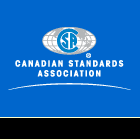CSA in Climate Change
 Toronto, Canada (CNW) - the Canadian Standards Association (CSA), a leading developer of standards and codes, has announced the availability of its CSA in Climate Change Background Report. The new white paper was developed to help provide the media, public, academia, government bodies and other stakeholders with a comprehensive overview of CSA’s role in supporting the development and deployment of technologies, services and processes that seek to reduce the impact of climate change.
Toronto, Canada (CNW) - the Canadian Standards Association (CSA), a leading developer of standards and codes, has announced the availability of its CSA in Climate Change Background Report. The new white paper was developed to help provide the media, public, academia, government bodies and other stakeholders with a comprehensive overview of CSA’s role in supporting the development and deployment of technologies, services and processes that seek to reduce the impact of climate change.The CSA in Climate Change Background Report outlines how CSA is leveraging its core strengths such as engaging stakeholders, facilitating technology innovation and adoption, and diffusing knowledge and resources to help address climate change issues. The report also identifies many of the tools and training solutions offered by CSA to help organizations with the four basic components of a GHG Management plan: measuring their current carbon footprint, quantifying and publicly reporting emissions reductions, tracking and identifying improvement, and public recognition for their efforts.
The report notes current market survey results suggest that climate change looms ever larger on the corporate agenda. In early October, the Canadian Council of Chief Executives reported "unprecedented consensus" on the need to combat global warming and their obligation to do more to help. Executives called climate change "the most pressing and daunting issue" today. (Globe and Mail, October 1, 2007)
The annual Carbon Disclosure Project (CDP5) survey, released in September 2007 received a 77% response rate from the FT500 (up from 72% a year earlier) and "the gap between climate awareness and action continues to narrow" (CDP Report 2007). More than three-quarters of responding companies reported implementing a GHG emissions reduction initiative, up from 48% in 2006.
The made-in-Canada edition of CDP5, the Canada 200, reports that 64% of respondents have a formal GHG emissions management system - either targeting emissions directly, or indirectly through energy efficiency and conservation.
Canadian Standards Association (CSA) has encountered a similar sense among its more than 9,000 members, who represent business, industry, government, academia, consumer groups and others. Senior managers are expressing interest in demonstrating leadership and accountability on the climate change issue. They are looking for cost-effective ways to improve carbon management - voluntarily. And they want tools to measure and report on their progress.
Momentum for action on climate change is coming from multiple stakeholders:
- Investors who want to understand their risk exposure
- Consumers who seek greener choices
- Employees who want leadership and action in their workplaces
- Government which formulates public policy and decides on regulations
- Businesses that wish to demonstrate corporate social responsibility and enhance their reputations
Large emitters - that is, those facilities emitting more than 100,000 tons of CO2 per year - have faced the threat of mandatory emission reductions for some time. And many started producing greenhouse gas inventory reports years ago.
Today, there are thousands of organizations, small and large, involved in light industrial activities, manufacturing, services and retailing throughout North America, that do not fall under regulations. Yet the most progressive among them are seeking ways to voluntarily measure and improve their carbon footprint, to improve performance, satisfy stakeholders and enhance their reputations. This voluntary sector is fueling demand for credible emission reducing projects…and for proper recognition of efforts to improve the carbon footprint.
Climate change is now driving public policy and corporate decisions. It is also altering consumer behaviour and rewarding those who build environmental sustainability into their practices… the ones who introduce leading edge technologies to reduce energy consumption.
Due to Canada’s diverse geography, more than 50 per cent of this country’s gross domestic product is estimated to be affected by climate change and extreme weather events. For good reason, climate change has become intertwined with politics, culture, economics and society as a whole.
Today’s senior decision-makers want to know the size of their organization’s carbon footprint. They are looking for cost-effective ways to improve carbon management - voluntarily. And they want tools to measure and report on their progress.
The report notes that all organizations, regardless of size, should consider four essential tools:
First, they need simple, user-friendly tools to enable them to establish their carbon footprint. The ISO 14064-1 standard is a good place to start for organizations that wish to establish their GHG inventory. CSA offers training on how to use the standard and how to verify inventory reports.
Second, they need a way to document and track improvements to their carbon footprint.
Third, they want a way to be publicly recognized for their efforts.
Finally, they need credible carbon reduction projects to become carbon neutral. The IS0 14064-2 standard offers a solution for achieving this, through its independent, third-party verification of emission reductions.
CSA in Climate Change Background Report is available in English and French free online
For More Information: Canadian Standards Association
You can return to the main Market News page, or press the Back button on your browser.

